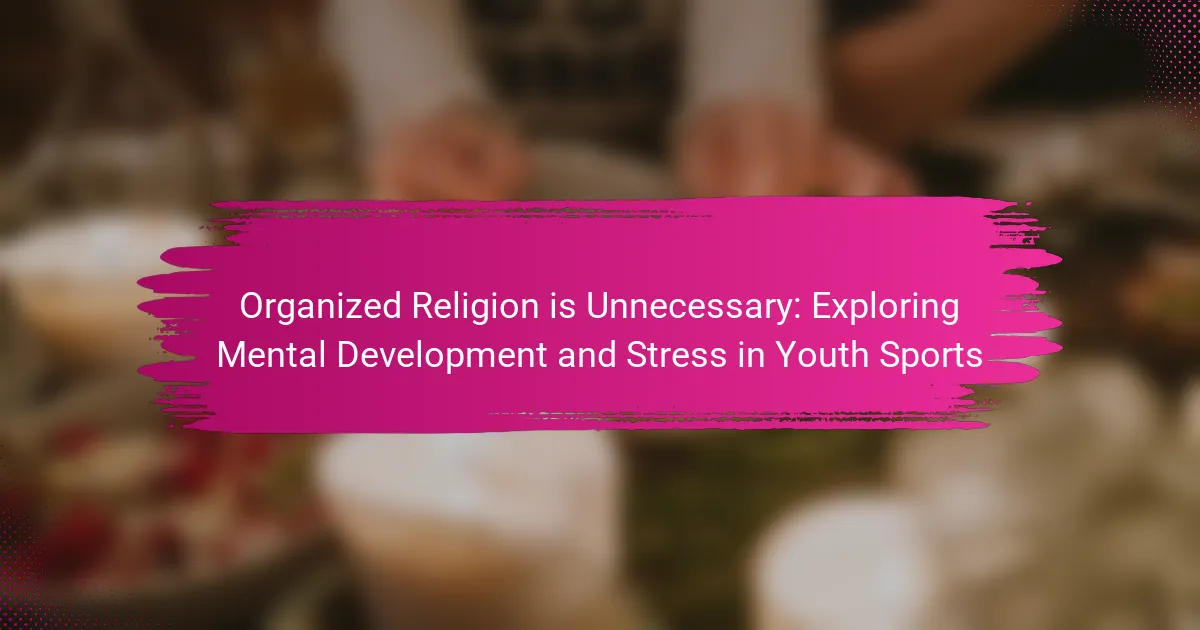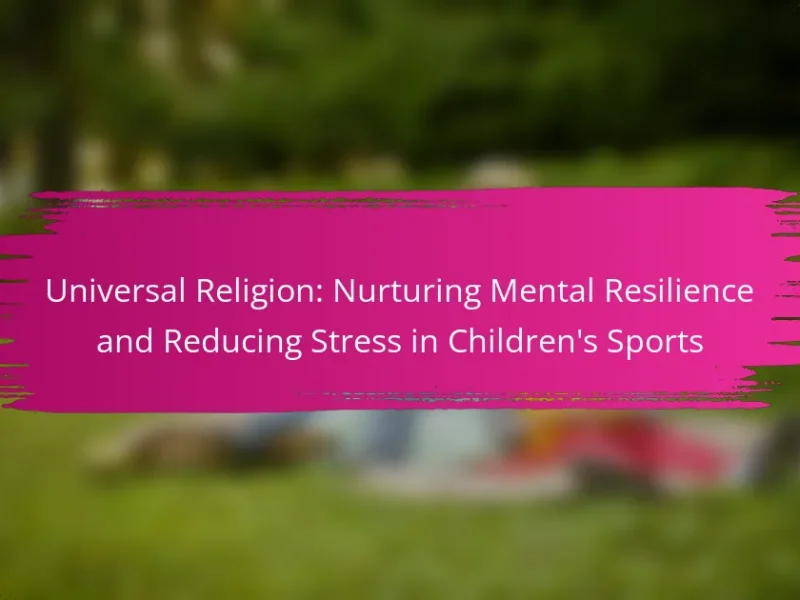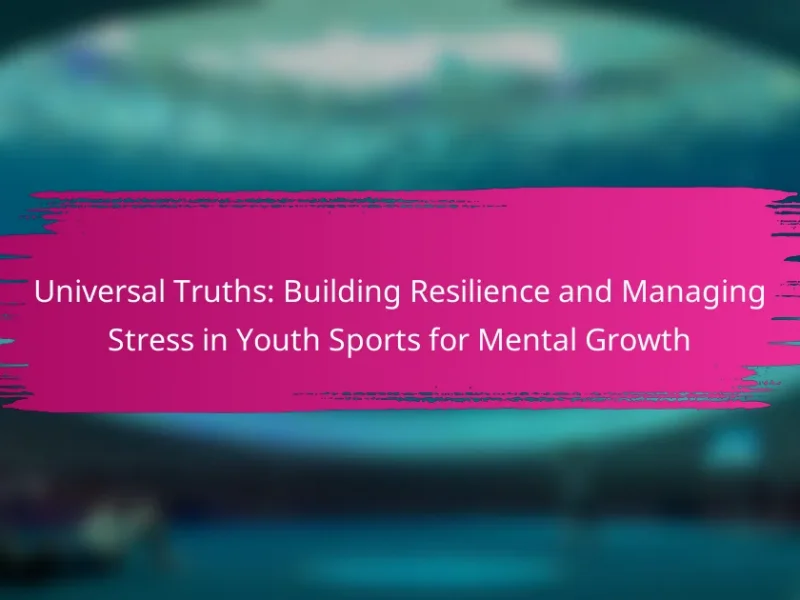Mental development is crucial for enhancing performance in youth sports and managing stress. Young athletes face challenges like performance pressure, academic balance, and injuries. Effective coping strategies, such as mindfulness and peer support, can mitigate these stressors. Organised sports foster resilience, teamwork, and emotional regulation, contributing to overall mental well-being.

How does mental development influence performance in youth sports?
Mental development significantly impacts performance in youth sports by enhancing focus, resilience, and decision-making skills. As children develop mentally, they become better equipped to handle the pressures of competition. Research shows that athletes with strong mental skills tend to perform better under stress. Additionally, mental development fosters a growth mindset, encouraging youth to learn from failures and persist in the face of challenges. This combination of cognitive and emotional growth leads to improved athletic performance and overall well-being in young athletes.
What are the key stages of mental development in children?
The key stages of mental development in children include sensorimotor, preoperational, concrete operational, and formal operational stages. Each stage represents a unique phase of cognitive growth, influencing how children understand their world, process information, and manage stress, particularly in contexts like youth sports.
The sensorimotor stage (birth to 2 years) involves learning through sensory experiences and motor actions. The preoperational stage (2 to 7 years) is characterised by symbolic thinking and egocentrism, where children begin to use language and engage in imaginative play. The concrete operational stage (7 to 11 years) marks the development of logical thought, enabling children to understand concepts of conservation and perspective-taking. Finally, the formal operational stage (11 years and older) allows for abstract reasoning and hypothetical thinking, crucial for navigating complex social situations, such as those encountered in organised sports.
Understanding these stages helps caregivers and coaches support mental development and reduce stress in youth sports by tailoring approaches to children’s cognitive abilities.
How does participation in sports contribute to cognitive growth?
Participation in sports significantly enhances cognitive growth by improving focus, decision-making, and problem-solving skills. Engaging in youth sports fosters teamwork and discipline, which are crucial for mental development. Studies indicate that regular physical activity boosts brain function and cognitive abilities, leading to better academic performance. Additionally, the stress management skills developed through sports participation contribute to overall mental resilience, making youth more adept at handling challenges.
What skills are enhanced through youth sports participation?
Youth sports participation enhances various skills, including teamwork, discipline, and stress management. These experiences foster social interaction and emotional resilience. Participation encourages goal-setting and improves self-esteem through achievement. Additionally, youth sports develop leadership abilities and promote physical health, contributing to overall mental development.
How does teamwork in sports foster social development?
Teamwork in sports significantly enhances social development by fostering communication, cooperation, and leadership skills. Engaging in team activities promotes empathy and conflict resolution, essential for personal growth. Studies indicate that youth involved in team sports exhibit higher social competence and improved relationships with peers. This unique attribute of teamwork cultivates a sense of belonging, vital for mental well-being. As a result, young athletes develop a supportive network that contributes positively to their overall social experience.

What are the common stressors faced by young athletes?
Young athletes commonly face stressors such as performance pressure, balancing academics and sports, injuries, and parental expectations. These factors can significantly impact their mental health and development. Performance pressure often stems from the desire to succeed, which can lead to anxiety. Balancing academics and sports creates time management challenges. Injuries not only affect physical capabilities but also contribute to psychological stress. Parental expectations can add an additional layer of pressure, influencing athletes’ self-esteem and motivation.
How do competition and performance pressure impact children?
Competition and performance pressure can negatively affect children’s mental development. High expectations may lead to increased anxiety and stress, hindering their enjoyment of sports. Research indicates that children exposed to intense competition often experience diminished self-esteem and motivation. Additionally, the pressure to perform can result in burnout, causing them to disengage from physical activities altogether.
What role does parental expectation play in youth sports stress?
Parental expectations significantly contribute to youth sports stress by creating pressure to perform. This pressure can lead to anxiety and reduced enjoyment in sports activities. Studies show that children with high parental expectations often experience increased stress levels, impacting their mental development and overall performance. The balance between support and expectation is crucial for healthy youth sports participation.
How can coaching styles affect a child’s stress levels?
Coaching styles significantly influence a child’s stress levels in youth sports. Authoritative coaching fosters a supportive environment, reducing anxiety and enhancing performance. Conversely, authoritarian styles can elevate stress, leading to burnout and decreased enjoyment. Understanding these dynamics is crucial for promoting mental well-being in young athletes.

What unique coping strategies can help manage stress in young athletes?
Young athletes can manage stress through unique coping strategies like mindfulness, peer support, and structured routines. Mindfulness techniques, such as meditation and breathing exercises, enhance focus and emotional regulation. Building a support network with teammates fosters camaraderie and reduces feelings of isolation. Establishing structured routines helps athletes create a sense of control and predictability, which can alleviate anxiety. These strategies contribute to mental resilience, promoting overall well-being in competitive environments.
What techniques can coaches implement to reduce stress?
Coaches can implement mindfulness techniques, structured routines, and open communication to reduce stress. Mindfulness practices, such as breathing exercises, help athletes focus and manage anxiety. Structured routines create predictability, enhancing comfort and performance. Open communication fosters trust, allowing athletes to express concerns and receive support.
How can parents support their children in managing sports-related stress?
Parents can support their children in managing sports-related stress by fostering open communication and encouraging a balanced approach to competition. They should help children set realistic goals, emphasizing effort over results. Providing a supportive environment that prioritises enjoyment can alleviate pressure. Teaching stress management techniques, such as mindfulness and relaxation exercises, can also be beneficial. Regularly engaging in discussions about feelings and experiences in sports promotes emotional well-being.
What communication strategies are effective for parents?
Effective communication strategies for parents include active listening, encouraging open dialogue, and using positive reinforcement. Active listening fosters trust and understanding, allowing children to express their thoughts and feelings. Encouraging open dialogue creates an environment where children feel safe to share concerns. Positive reinforcement helps build self-esteem and motivates children to communicate more effectively. These strategies contribute to healthier parent-child relationships and support mental development.
How can mindfulness practices be integrated into training?
Mindfulness practices can enhance training by improving focus and reducing stress. Integrating techniques such as breathing exercises and meditation can help athletes manage anxiety and enhance performance. Regular mindfulness sessions can lead to increased mental resilience, fostering a positive training environment. Additionally, incorporating mindfulness into warm-ups can prepare athletes mentally, enhancing their overall experience in youth sports.

What rare but significant impacts can youth sports have on mental health?
Youth sports can significantly enhance mental health by fostering resilience, social skills, and emotional regulation. Participation in organised sports often leads to reduced anxiety and depression, as physical activity releases endorphins. A unique attribute is the development of teamwork skills, which can create a supportive community, further enhancing mental well-being. Rarely acknowledged is the impact of structured competition, which teaches youth how to cope with stress and failure, preparing them for future challenges. Engaging in sports not only builds physical strength but also nurtures a robust mental framework essential for personal growth.
How can youth sports participation influence long-term mental health outcomes?
Youth sports participation can significantly enhance long-term mental health outcomes. Engaging in organised sports fosters teamwork, builds resilience, and alleviates stress. Studies show that youth athletes experience lower rates of anxiety and depression compared to non-athletes. Regular physical activity is linked to improved mood and cognitive function, promoting a positive self-image. Additionally, the social connections formed through sports can provide ongoing emotional support, further benefiting mental health throughout life.
What are the potential risks of over-commitment in youth sports?
Over-commitment in youth sports can lead to significant mental and physical risks. These include increased stress levels, burnout, and decreased enjoyment of the sport. Additionally, over-commitment may result in injuries due to fatigue and a lack of recovery time. Young athletes may also experience social isolation, as they prioritise sports over friendships and family time. Ultimately, the pressure to succeed can hinder mental development, leading to anxiety and depression.

What are best practices for promoting mental well-being in youth sports?
Promoting mental well-being in youth sports involves creating a supportive environment, emphasising enjoyment over competition, and encouraging open communication. Coaches should prioritise mental health by integrating mindfulness practices and fostering teamwork. Regular feedback and recognition can enhance self-esteem, while ensuring a balanced schedule prevents burnout. Engaging parents in discussions about mental health can further reinforce a positive atmosphere.
How can a balanced approach to sports and academics be achieved?
A balanced approach to sports and academics can be achieved through effective time management and prioritising mental well-being. Youth sports should focus on skill development rather than competition, reducing stress and enhancing enjoyment. Integrating academic support within sports programmes fosters a holistic development environment. Encouraging open communication between coaches, parents, and students creates a supportive atmosphere that values both academics and athletics.
What role does inclusive coaching play in mental development?
Inclusive coaching significantly enhances mental development in youth sports by fostering a supportive environment. This approach prioritises emotional well-being, encourages participation, and builds resilience. As a result, athletes develop better coping strategies for stress, which is crucial for their overall mental health. Inclusive coaching practices also promote teamwork and social skills, essential attributes for personal growth. Research indicates that athletes in inclusive settings experience lower anxiety levels and higher self-esteem, contributing to their long-term mental development.
What common mistakes should be avoided in youth sports programmes?
Youth sports programmes should avoid several common mistakes to enhance mental development and reduce stress. First, overemphasis on winning can lead to burnout and anxiety among young athletes. Second, neglecting individual skill development undermines personal growth and confidence. Third, poor communication between coaches and parents can create confusion and frustration. Fourth, lack of inclusivity may alienate participants and diminish their enjoyment. Lastly, insufficient focus on teamwork can hinder social skills and collaboration. Addressing these issues promotes a healthier environment for youth athletes.
How can unrealistic goals be detrimental to young athletes?
Unrealistic goals can severely impact young athletes by increasing stress and diminishing self-esteem. When expectations exceed their capabilities, athletes may experience anxiety, burnout, and a loss of enjoyment in sports. This can hinder their mental development and discourage participation. Additionally, the pressure to meet unattainable benchmarks often leads to negative self-perception and fear of failure, further exacerbating stress levels.
What are the signs of burnout in young athletes?
Burnout in young athletes manifests through emotional exhaustion, decreased performance, and loss of interest in sports. These signs can include chronic fatigue, irritability, and withdrawal from teammates. Recognising these symptoms early is crucial for mental health and development. Research indicates that over 30% of young athletes experience burnout, impacting their overall well-being and performance.
What expert insights can enhance mental resilience in youth athletes?
Expert insights can significantly enhance mental resilience in youth athletes by focusing on psychological strategies and supportive environments. Techniques such as mindfulness training improve focus and reduce anxiety, while goal-setting fosters a sense of achievement. Encouraging open communication with coaches and parents creates a supportive network, essential for emotional well-being. Additionally, teaching coping mechanisms for stress helps athletes navigate competitive pressures effectively. These approaches collectively build a robust mental framework, essential for success in sports and life.


